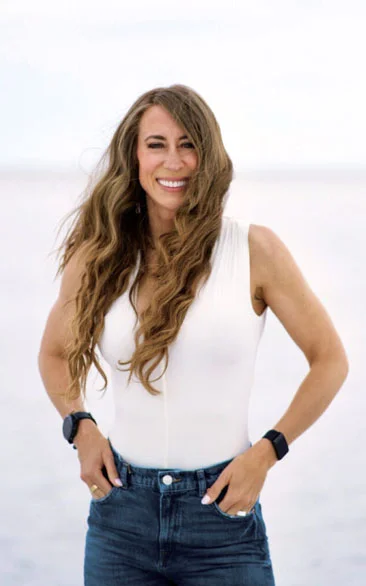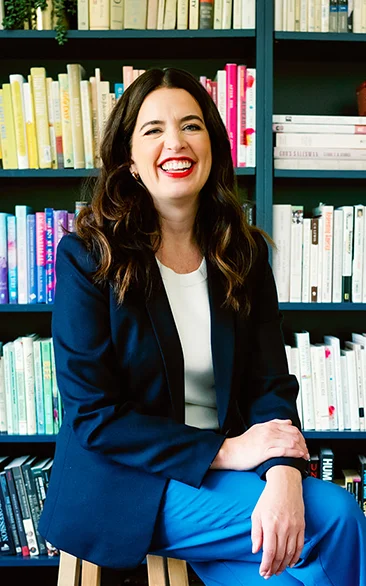Kate Bowler: Sometimes we can be sold a story. A story about our worth. That if we just give more. Be more flexible. Never say no. Then we will be more lovable, more valuable, easier to be around. Well, it turns out that’s not the whole story. Yes, we can be generous and compassionate. Yes, empathy really is a superpower. But no, being limitless is a myth. It will not help you serve others well or take your own needs seriously, or recognize when there really is a better person for the job. But how do you know when to say no? How do you know the edges of what’s possible in your already two full day? My name is Kate Bowler. And this is Everything Happens. And it feels important to let you know right now that I am not good at this part. As like Ennegram two, heart on sleeve person, don’t tell me I can’t help someone this, But you will be able to tell it’s a bit of a soft spot for me. But when I got really sick, or on days like today, when I’m dealing with just yet another wave of chronic pain, my limits are kind of set for me. I don’t have that much of a choice. And then I start to feel like a failure that I can’t do everything that I used to do in a day, or was even able to do yesterday. Yet another reminder that, yes, I’m human, I’m finite. I’m not happy about it. Does it sound like I’m happy about it? But I just figured maybe this was a good time to ask someone else for some help. I wanted to get a little lesson in boundary setting from the Boundary Queen herself. She understands how limits actually set us free to love others and ourselves, well. And best of all, she teaches us how to do it in a way that is clear and kind. And honestly, I’ve learned so much from her and I hope you will too. My guest today is Melissa Urban. Melissa Urban is CEO of the Whole30 and an authority on helping people create lifelong healthy habits. She is a whopping six times New York Times bestselling author, including the number one bestseller, the Whole30. And she has been featured basically everywhere people have eyeballs, Good Morning America, New York Times, Wall Street Journal, Forbes, CNBC. And she has a brand new book that I am completely obsessed with called “The Book of Boundaries: Set the Limits That Will Set You Free”. Melissa lives in Salt Lake City, Utah, with her family. And I really, really like it when she tells me what to do. And I hope that she does that for the rest of our lives. Melissa, my friend, thank you so much for doing this with me today.
Melissa Urban: Hi Kate, I’ve been so excited to talk to you.
Kate: Oh, my gosh. Me too. This is my chance for a lot of existential feelings about boundaries and how terrified they make me. So we will dig right in.
Melissa: I’m ready.
Kate Bowler: Our culture poisons us by imagining that if we just work harder, get up earlier, or drink celery juice, you know make your bed, read this book, etc., it’ll fix your life. And I imagine you see a lot of that in your industry. And there are, of course, some things we can fix and some things we can’t no matter how hard we work.
Melissa: Yeah.
Kate: How do you boundaries help us better live inside of the limitations that already exist.
Melissa: The framework that you just set up is exactly why boundaries are so powerful. There is this misconception about boundaries that they are about controlling other people or telling other people what to do. When in reality, boundaries are about telling other people and the world what you are willing and able to do to keep yourself safe and healthy. So, boundaries are like the one thing we can control because we can control our response to a situation. We can control how we choose to show up for other people and for ourselves. So, the active healthy boundary practice is essentially a return to your self, checking in with your own needs, trusting that you know your own needs best. Acknowledging that your needs have worth and value, and then taking the actions that you can take to ensure those needs are met.
Kate: I until I read your book, I honestly had not thought about the intimacy of that place, about how especially after something happens, that boundaries that you have to develop maybe an entirely different relationship with what you thought boundaries were. If you don’t mind bringing me back to kind of the beginning of your discovery of like needing boundaries, there was a really strong connection there between boundaries and a really traumatizing experience you went through as a teenager that led you into a very boundary-less place?
Melissa: Yes. I did not have boundaries modeled for me growing up, as most of us don’t. I have a large Catholic Portuguese family who just operated under the M.O. of like if we don’t look at it or talk about it, it doesn’t exist. So that’s how I grew up. I had an incident of sexual abuse from someone in my family when I was 16 and really did everything in my power over the course of the next few years to repress it, numb it, forget it, not talk about it. My family did not handle it well when I finally told them. And I entered into a five year period of serious drug addiction, where I used drugs to numb an escape and try to, like, not be in my body. And I finally entered into rehab for the first time and had a year in recovery before I relapsed. And people looked at that and they went, How do you relapse after a year, a whole year of like being in recovery, going to meetings? And what I know now is because I had sat no boundaries, I had set one shaky little boundary with myself. Hey, Melissa, let’s try not to use. And of course, it wasn’t enough, right? I relied on, like, luck and willpower and the fates, and the tides, and to to keep me from using. And it wasn’t until I went through recovery the second time and came out of it that I found myself once again in a very precarious position at a party, at which I had no business attending with people I didn’t know, doing God knows what in the bathroom. And I said to my friend in a moment of just absolute panic for my very life, I can’t be here. This is not safe for me. You need to take me home. That was like the first time an honest to God boundary tumbled out of my mouth and I don’t think I even realized it for what it was in the moment. But that was the one moment where boundaries expanded my life beyond anything I had imagined, and it was really powerful for me.
Kate: This just take me out of here.
Melissa: And I was so scared to say it because I was terrified that telling people what I needed, that I wasn’t okay, that I had relapsed, that they couldn’t still offer me drugs and they couldn’t smoke pot around me, and you can’t bring that into my house. I was terrified that that would shrink my life to a place where I would be so isolated and lonely and cast out. And the opposite. It was the opposite, that one. You know, the act of setting healthy boundaries helped me reestablish trust in friendships and get rid of the friends who could not comply. And keep the ones who could closer and start to advocate for myself and learn to trust myself again. So it was this incredibly powerful learning experience that came born of this moment of like, real crisis and fear.
Kate: I would never have thought that it, I mean gosh, I guess in part because addiction is not something that we have a lot of like public honesty around. But one of the things I would imagine with a conversation around boundaries is that people feel like they have to earn their boundaries. Like you have to have the right kind of problem. What you’re describing is a moment of really incredible vulnerability, I imagine, where you didn’t feel like you were the shiniest version of yourself. And you have to reach, reach inside some deep place to just conjure up the feeling of, yes, I am worth protecting in this moment.
Melissa: Yes. I mean, to think back to that time period, I had no self-worth or value. I still thought of myself as this worthless, dirty drug addict, who lied, and cheated and stole. And like all of those things I had done. But I had a really hard time seeing myself as anyone else. And that boundary did not come from this moment of recognizing my worth and my value. I was literally afraid for my life. I knew that if I didn’t say something in this moment, I was going to end up in the same situation that caused me to relapse the last time, and I didn’t think I would make it back, so I was terrified. But the fact that I spoke that boundary and my friend, instead of making fun of me or, you know, leaving me alone, looked at me and said, Oh. Okay. I didn’t know and asked me a few questions and we left. That was the moment like thank God that he was in that space with me and not someone else. But that was the moment where I was like, Wow, I just asked for what I needed and someone gave it to me. And that, what does that mean?
Kate: Yeah, sorry. And then they gave it to me. So is that what we’re describing? Because one of the common things I hear. So one of the things that you really unifies this community is the experience that they’ve either gone through something really hard, or they’re in a profession where they see hard things a lot, or they’re in some kind of, you know, in a caregiving or a friendship situation in which they’ve got to be up close to the thing. That’s the thing that’s happened. And one of the immediate category confusions for all of us, you know, I’m is is that like I’m this bad thing has happened to the super highway goes right to well then I am the bad thing. I am the thing that happens to everyone. I am the and I. So you went just like conjuring up any of those magical feelings of self-worth in order to ask for something different to happen is so, at least if it’s just I think it feels really fraught for all of us, regardless of whether it’s addiction, or a random tragedy, or a divorce or. But in the brokenness, we we have a different constellation of needs than maybe we did like before. When we might have been maybe the magical and vulnerable person that we miss. That we miss so much.
Melissa: My experience was fortunate in that I set a boundary with someone who loved me and who respect, wanted to respect me. I got lucky because I had not yet settled on the idea that I was worth having needs and I was worth taking care of those needs. And until I arrived at that conclusion on my own, relying on external validation that my needs were worthy is a very dangerous place to be. Right. Had that person said like, no, you know, that’s so silly. Don’t be ridiculous. I’m going to go take off. That would have been really challenging because I had not yet recognized that I had value. And of course, there was this like before and after. Before Melissa, before the abuse, and the addiction was a very different person. And after Melissa, I still hadn’t learned how to see her and all of the things that I had done to save my own life, and hadn’t come around to that conclusion yet. But I will say that one experience did give me the confidence to reevaluate and say, well, if this person that I love and trust so much is telling me, yes, he’s willing to respect my needs. Maybe I should really look at respecting my own, maybe I am worthy of that. And that sparked this whole process of self-awareness and trying to redefine who I was as a person.
Kate: I have mostly built my life out of like an outside in model. Where I’m like, if I look at you and you look at me with love, then I can feel love, you know? And in these other moments, it feels like it’s just like a like a lot of tar pit. Like, a lot. And I, you know, so part of what has been difficult for me is like just using enough of those lucky moments where the person reflects back to you the thing you actually need. And then try to like, just kind of like. I’m picturing like building something out of like toothpick walls at the beginning. We were like, okay, I’m getting a glimpse that maybe I can deserve better behavior.
Melissa: Yes.
Kate: I’m getting a sense that maybe I’m thirsty when I feel thirsty.
Melissa: Yes
Kate: But just sometimes like, very basic stuff when you haven’t really had that mirrored to you as an acceptable feeling.
Melissa: Yes. And using that as like a launching off point. It’s this two sides of the same coin. If you rely on and allow other people’s compliments, or love, or validation to fill you up. By default, you have to allow their insults or their rejection to suck you dry. And like, that’s not a good place to be. It’s one you can’t have one without the other. So thank goodness I was also in therapy doing this work where my therapist was insistent in the most annoying way, that I figure out how I felt about myself. Right? When someone would tell me I’m pretty, he would go, That’s just how that person is experiencing you. What do you think? Are you pretty? Are you beautiful? Are you cute? Are you ugly? Are you? Oh, it was like one of them right then. Now imagine that with every trait about myself. But he forced me to do this level of self-awareness so that when you tell me I look pretty, I love that that’s how you’re experiencing me. But it has no impact on how I think about myself. And that practice has been so hugely important in this idea of setting boundaries because I’m like, I know my worth. I know my value. I have, I assign my worth with characteristics that you can’t take away from me if I’m no longer a mom, if I’m no longer a CEO, if I’m no longer an athlete, I still have my value. And that’s where my boundary practice stems from.
Kate: Yeah, podcasts are a notoriously visual medium. So what people did not see when you said that how people are experiencing is pretty. I like openly clutched my heart because it is so what you’re describing is, I find it especially as a very open hearted, empathetic person, it’s so easy for me to feel what other people are feeling. And so filtering that information with a set of criteria, which is what you do so beautifully in this book. I found very challenging, which is why you’re going to hear just a lot of uncomfortable laughter.
Kate: I mean, it’s such a basic question, like, how do we know when a boundary is needed? But I don’t even know if a lot of people know what it even feels like in their own, especially if they’re just so hyper attuned to everybody else’s situation. Like how? How would someone know when a boundary is needed?
Melissa: Yeah. So a few signs that you might need to set a boundary either with someone else or around certain conversation topics or behaviors, or even with yourself if you feel dread, or anxiety around a subject or a person. So, it’s like the mention of your mother-in-law coming to visit and you’re just like, Oh, okay, okay, okay. I’m gearing up for this, right? Steeling up for it. Or the the coworker that you see them approaching and you’re just dreading or anxious about the conversation. That’s a clear sign that a boundary is needed. If you don’t like who you become when you are with this person or in a relationship with this person. If you somehow feel like you’re not able to show up as your fullest self or are being asked not to show up as your fullest self, that’s a good sign. If you feel taken advantage of when you leave that conversation or that person, that’s a sign. Just the idea of general, like energy leakage. If you feel like I don’t know where all of my energy is going, but I certainly don’t have enough for me. I don’t have enough for the people in my life that I’m really, you know, that are really important to me, my spouse, my kids. That’s a sign that a boundary is needed. If you’ve considered taking a break from someone for any reason that to sign a boundary is needed. So there’s this big long list, but it generally is accompanied by this feeling of anxiety or resentment, or dread, or uncertainty, or mistrust in some of your relationships.
Kate: I sometimes even feel like after they’ve walked away and I realize like, oh, that was I absorbed, that was that person was not that great. Like I might I won’t get like an aftershock feeling.
Melissa: Yes. Or if they leave and you replay in your head all of the things that you wish you had said. I wish I said that. I wish I did not let that slide. I wish I had called them out on that. Like that’s a clear sign to.
Kate: You said something about what’s at risk when we don’t set boundaries. That really has stuck with me about how uncomfortable it is, but how uncomfortable it was going to be anyway. This was my. Interpretation. Like you’re going to pay the cost one way or the other, so maybe think about it in advance.
Melissa: Yeah. I mean, that’s one of the kind of most common. I think objections to boundaries I get from people is people are like, Oh, it’s just so uncomfortable to like say the thing, to bring it up, to invite them to change their behavior, to help me meet my needs like it’s uncomfortable. And the way I always very gently put it is but like, how’s it working out for you now, really? You know, how is that working out for you? And and said with so much love, the whole reason that you’re like reading this book or coming into this conversation is that it’s probably not going that well. You’re probably already uncomfortable. The. The way that they’re always dropping by without calling. Even though you’ve asked with the fact that they’re constantly talking about your body or your weight when you wish they wouldn’t, or they’re inserting themselves into your medical care or treatment, suggesting that if you only did this, surely you would feel better. Like that is super uncomfortable too, and continuing to ignore that behavior, or let them run you over, or pretend that you don’t have needs or swallow your own needs, is an uncomfortable path that is just like a swirling drain. It’s not going to get any better. And this other path where you actually speak your boundary, that path has the chance of improving your relationship, saving your relationship, improving your mental health, and your physical health. So I figure if it’s going to be uncomfortable, you might as well take the uncomfortable path that could actually bring you like real positive change.
Kate: Yeah. Yeah. That does have a glimmer of hope in it, doesn’t it? I have always been very nervous about setting boundaries because there’s just certain qualities in my Christian culture that are really close to virtues, like humility, which can be very easily misconstrued as self-hatred for not realizing your own preferences. Wanting to be helpful creates sort of like a hyper flexibility. There’s a lot of like good Christian womanhood stuff that I am obviously just trying to swim my way out of. But I do find there’s a kind of intense equation in my mind between boundary-lessness and being more lovable, being easier to. Yeah, there’s a self-sacrifice bit that I just I was really struggling with when I was thinking about some of the alternatives that you’re offering because it feels initially like. Signing myself up as maybe like high maintenance or less. I’m just going trail off now because I’m uncomfortable, the less likable.
Melissa: It is though, I mean, when you look at the influences from the patriarchy and society, diet culture, and religious influences, especially on women. Very much so on moms to keep ourselves small, and compliant, and needless, and put everyone else’s needs above our own. And then you add to this idea that like you are more lovable if you just do what other people want you to do. Like, first of all, lovable to whom? Because I’m certainly not any more lovable to myself, when I do that right. It feels like I’m selling myself out and that doesn’t feel very good. And also, if my if their love is conditional on me constantly swallowing my own needs and feelings and value in order to earn that validation, I don’t want that love. That’s not the kind of love I want because that is not sustainable. Like that’s not how I want to show up. So if my love is dependent on that, I’m going to say no thank you. And I think that we often have this fear that people’s love or respect or attention is is predicated on us always giving in, never having needs, always putting their needs first. But I like to encourage people to assume the best, assume that these people, because they are not mind readers, didn’t know that you had a limit in this spot. And all you would have to do is say, actually, I have a healthy limit here. And if if I could invite you to meet me at this limit, this would allow us to show up in a way that would let both of us enjoy this relationship so much and feel trust and respect. And if you invite them in to that, most of the time people are going to go, okay. And it really can be that simple. And if you just have one or two of those experiences, then you’re like, Oh, okay, maybe the story I told myself about how lovable I am is dependent on whether or not I express my needs is like just a story.
Kate: Mm hmm. There’s two really true things in there that I’d love to take a minute to ask you about. One is when someone is over-giving and they have a story in their minds about how everybody else around them requires that much over giving. You said something true and completely horrible. That said people will take as much as you’re willing to give. Uh huh. Like no one’s going to patrol those boundaries for you that’s your job. Can we just dwell on that horrible fact for everyone?
Melissa: Yeah. Aren’t Truth’s always just a little horrible? Most of the time.
Kate: I should be the subtitle of this podcast. Horrible, Horrible Truths.
Melissa: People will take as much as you are willing to give. And I went on immediately to say, like, that is not a bash on anybody. It’s just human nature, right? If you are willing to give more of your time, more of your energy, more of a listening ear, more financial support, more, you know, effort at work, like of course, people are going to accept that. Of course, it feels great when you can provide for other people. And I think the reason I share that is so that people understand that you have to be the one to set your own limits. It would be wonderful if you could walk into an office, or a new romantic partnership, or a relationship with your in-laws and they proactively said, I want to know where your limits are so that I don’t overstep them. We are big fans of boundaries in here. And and we’re going to, you know, that like almost never happens. So you have to be the one to identify where your limits are, communicate those limits clearly with other people because again, they’re not mind readers and we can’t just hint or passive aggressively share or like make a joke about it. We have to actually state the limit and then again extend them this invitation to meet you in that limit. That’s how it has to go, because the alternative is they will continue to want to take from you and you will not have any way to say, I am overdrawn.
Kate: One thing my best friend and I say a lot is. We can always tell in someone else’s story when they say, Why don’t they just stop asking? That we have hit a place of deep confusion. It’s like, so when you wrote, like, they’re never going to stop asking you. I called her and I was like, Bad news. Yeah. Yeah. They’re just actually not going to stop asking.
Melissa: Why would they if they continue to get everything they want, why would they stop asking? I wouldn’t, you know. Yeah, why not?
Kate: Like, I press this lever, the good thing comes out. Yeah.
Melissa: Got to keep pressing it.
Kate: One very common response I’m sure you get a lot is like, good for you. I’m so glad you can have a boundary. And I’m thinking right now, of all the people that we know who are really, really wiped out and they really wish that they could choose, like, like a lot of the self-care language won’t land with them because they’re kind of beyond, and they have genuinely intense constraints around their time and resources. So people in caregiving professions, some people’s jobs like it’s just it’s there’s no fat. There’s just lean muscle on this. Like how would we talk about boundaries to people who have very few choices?
Melissa: I would say in those circumstances, it’s even more important to tap into your own needs and set the boundaries that serve you. And so often, especially when we are in a caregiver role, we become so focused on the needs of the other person, as we should. But, I can’t continue to give to anybody if my cup is drained, if it is empty. And in my four years of navigating my chronic brain injury, I learned that so quickly that I couldn’t give to my family, my husband, my community, my work, my friends if I was not taking care of myself. And I became quite ruthless in a good way with reminding myself and creating space for myself to check in with my needs, and what I wanted. To make sure that I had the support that I needed in navigating some of my own challenges, and my own help, and just explaining to people very clearly like I am in a season right now where I just I can’t I don’t have this to give. And here’s how I can show up because I, you know, it’s not always a black or white offer on sometimes there are compromises. So, I don’t think I saw my girlfriends for like a year, but I made sure that every once in a while I’d send a funny, you know, meme, or I’d check in and see how things were going. Or I made a donation to the charity event that they were working on. I stayed connected in a way that worked for me. And I invited them to say, this is enough for us right now to. Like, we really appreciate the effort that you’re making. And we see, we like respect that this is what you can do and like we’re going to hold space for you until you’re ready to maybe come back and do more. So it’s certainly not easy, you know, as I said. But the alternative is that you run yourself dry trying to do good things for other people, and then you’re not serving anybody at that point. And that’s not sustainable either.
Kate: That sounds like one of the more like awkward areas of boundary setting is in the sort of invisible economy of like friendships and loves, especially ones that we opt into. When you had your own injury, it really made you think a lot about the limitations that our bodies create for us, whether we want them to or not.
Melissa: Oh yeah. Almost four years ago, so it would have been December 2018. I was playing with my son and I got hit in the head pretty hard behind the left ear, directly behind the left ear, and didn’t realize until a day or two later until my husband was like you for sure have a concussion. And I thought that only happened to like football players and racecar drivers. And but most people’s concussions heal in 6 to 8 weeks. And I was like one of the very lucky 20% who have ongoing post-concussion symptoms. And I navigated symptoms regularly to the point where, like, my life was incredibly limited in terms of travel, exercise, work, showing up for speaking events, like all of the things that I do for about three years. And it did a number on me in a number of ways. I had to go back to therapy and think about if I’m not an active person, which was an assignment of my value that I had given to myself. I am an active person and if I am not an active person because I can’t exercise or hike or, you know, work as much, like who am I? What is my worth and value? That was like a whole process when you have a chronic invisible illness or injury, I am constantly questioning if people think I’m faking. I look fine. How come? I mean, am I really not fine? Because you look great. You know, you could do this, but why can’t you do that? That was like the self-doubt is tremendous. The spoons theory where I like really had to dive into like, how many spoons do I have today? And it was wild how much it varied and the things that just, like, gobbled all my spoons and then trying to explain that to someone else.
Kate: Melissa, will you explain to people that theory that’s so helpful for me?
Melissa: I, I didn’t know that there was a theory. I always called it. I would wake up with a dollar and the things that would cost you a couple pennies in your day, like waking up and, I don’t know, making breakfast for your kid. They cost me $0.50 all of a sudden, right? Things became more expensive. And there is this theory and I do not remember the person who created it, but it’s a lovely theory of essentially spoons. You wake up and everyone has the same number of spoons, but some people wake up with fewer spoons and some people have to use a lot more spoons on things that wouldn’t cost people as many. And it’s essentially just a framework for understanding that people who live with chronic illness, or injury, or other conditions, other, you know, grief or navigating trauma, whatever that life circumstance is, you have less capacity in the way your capacity is used, is vastly different than someone else’s. Or how maybe you used to use that not framework was really helpful, but it’s still really hard to explain it to someone else who isn’t like going through the same thing that you are going through. And I found it hard during that period to set healthy boundaries I needed for myself because as you already said, I felt like I hadn’t earned them. What right do I have to set boundaries around my work capacity when I’m barely showing up for work in the first place? Except I needed to. And that was a struggle.
Kate: Except I needed to. Except I needed to is like allowing ourselves to get to that bottom line. That’s so good.
Melissa: Mhm.
Kate: I just saying how much energy you have for something you know, like there’s a lot of like well what if I could do it and I don’t want to or. You want us to be like a lot more honest about.
Melissa: I do because I’m like, why isn’t that a good enough reason for saying no? How come you can’t just say no? I don’t want to. That should be okay. As long as you’re not saying that all the time or in those moments where of intense need, right? I wouldn’t say if someone says like, I would love for you to come with me to my dad’s funeral for you to go, nah, I just don’t want to. That would be inappropriate. But there are certainly many invitations in which I don’t want to is like a perfectly acceptable and polite response. I know. We’ll we’ll get there.
Kate: I laughed very I when I was reading your book, there was a lot of like just lightly uncomfortable laughter on my part. As I move through chapter, a chapter because so much of what you’re giving is, it really helps to hear different versions of the script over and over again. Because it starts to seem more plausible to be able to say things, you know, just like slightly adding more and more of your own language in a box that just says, Actually, I don’t think I can do everything you want me to do.
Melissa: Yeah. And I think people think that direct is rude. Like, by default, direct is rude. I grew up on the East Coast. We are as direct as it gets. We don’t mince words. We don’t mess around like we are super blunt. But I’m also very polite and I think I don’t know that I would ever say to a friend, I might I would say to a friend, no, I don’t want to. But that would be like a really good friend. And they would understand my context. But what I might say is, Oh, thanks for thinking of me. I got a hot date with my couch and Netflix tonight though like I am really looking forward to a night alone, or thanks but I I need a weekend at home, or thanks, but I don’t have the energy to go out tonight like ping me next weekend. Like there are other ways that you can say it without diving into this huge explanation that essentially mean I don’t want to or I don’t have the energetic capacity, but in a way that is perfectly clear but also perfectly polite.
Kate: Yes. Look, here’s the feeling I feel when I when I listen to you because I follow you on social media. I love listening to you. Here’s always how it goes. You, I like your no nonsense voice to makes me happy. So I like have this creeping sense that it’s there is not going to be enough in my day or in my body or in my. There’s just not an I have a creeping sense that there’s not enough. If I looked at my schedule it would be confirmed by don’t even want to look at my schedule.
Melissa: Yeah.
Kate: And then, but I, but there’s still this deep kind of frenetic feeling like I just need to pour more into it than I hear you or read you. And I think maybe, maybe there is a creeping sense of validation here that. If I just look at it, I can like borrow some of that energy. It always takes me a minute to like consolidate it for a second. But I feel like you’re the one that is constantly trying to remind us that that either that feeling of dread of someone else for a boundary or the sense of anxiety, of not being able to quite like get everything done is like is the beginning of a really good thought. Which is, which will unfortunately have to be, have to be a, I don’t even know. It’s why I wanted to say a request, but it’s not a request. It’s just a statement, which is. Yeah, I can’t.
Melissa: Yeah. Yeah. I can’t. Or I need. Or not like this. When I get stuck in like the shoulds. We should be able to do this. I look at my calendar. You should be able to do that. You used to be able to do that. Right. Why can’t, why can’t you do that? Maybe if you just, you could do that. And I find in those moments, I give away all of my power. Because do you know what? I can’t do it. If I could, I would be. But I’m not. So I can’t. And until I literally look at it and go, No, I can’t do this right now, that’s where I reclaim my power. And then it’s like, okay, all right, I can’t do this. What could I do? What do I need? What could I offer instead? Like, that’s where I have power.
Kate: Yeah. There’s a kind of courage that you share with others that has been just, like, really gone straight to my heart, honestly. Thank you so much for the very awkward bravery you show in helping us have a little bit more language around our limitations. We all need it, especially when we’re tired, or broken, or think that we maybe don’t quite deserve it in this season or wish we were someone else. And it is, it is a courage for the brokenhearted. And Melissa, I can’t tell you how much I have loved talking to you. Thank you.
Melissa: Thank you so much. That means a lot. Thank you, Kate.
Kate: Okay. I know you could hear me squirming and nervously, nervously laughing throughout this entire conversation. Please tell me I’m not the only person who struggles with this. It is just, oh. It is so hard to give up on the myth of the limitless self. So here is the blessing for all of us softies who want to imagine a better way, a better way to take care of ourselves, and our very loud pressing needs, while still caring for those around us. Because we don’t always get to pick our problems or the people who depend on us. Alright, so here goes. Bless you, you big hearted one. You who always show up or stay late or offer to bring dessert. You are the first to volunteer, or drop off dinner, or help them move. Really? When do we age out of helping people move? Asking for a friend. You offer a gift of love that doesn’t keep score and time that doesn’t count down. But things have changed. The chronic pain or disease or grief or just life itself leaves you with less. Less to give. Less to offer. Less to pour out. Dear one, hear me. Acknowledging the less does not make you less. It just makes you human. Bless you. As you ask for the help you so readily give. May you be met with the same love that you’ve always poured out. And may you find ways to give still that fit the shape of today’s available spoons. Not more, not less. Just what’s right for now. Bless you my dears.
Kathy from Chapel Hill: Hi. My name’s Kathy. I’m a geriatric nurse in Chapel Hill as a caregiver type personality and a nurse, especially now that my peers are caring for their parents. And I also work in a job that takes care of hospice patients and people that are ill. I identify with their suffering and sometimes take calls, and answer people’s questions, and help them at the expense of any boundaries and caring for some of my own family’s needs. And it sometimes becomes an issue with, you know, people in my life. Are you going to take that call? It’s it’s a tough thing as a caregiver to say no when they’re suffering. And that’s a tough boundary to figure out. And something I’m working on. Thanks.
Connie from Virginia: Hi. My name is Connie Thompson. I live in Manassas, Virginia. I think the hardest thing for me about boundaries is when I’m tired. Particularly when I’m with my family and my children are asking or family members are asking for help. And I just get too tired to protect my boundary. Sometimes I feel like it’s just easier to say yes, even though my heart says no.
Andrea from Winston Salem: Hey, this is Andrea Simmons. I’m a chaplain over at Forsyth Medical Center in Winston Salem, and I work specifically in oncology. I just wanted to say that the hardest part about boundaries for me is that I am a two on the Enneagram, which means the giver part type. And sometimes I go into the unhealthy part of not being able to say no because I feel like it, one makes me a bad chaplain or two makes me a bad friend. And so sometimes I overstep my own boundaries because I don’t want to people please too much. So I think that’s the hardest part for me, is that even when I set a boundary and I know that’s going to be healthy for me and will also be healthy for the people that I’m supposed to be helping or listening to, it still kind of feels a little icky and uncomfortable. And I feel like that’s the part that I’m struggling with, is learning how to lean into the uncomfortableness of a boundary.
Kate: A really special thank you to our generous partners who make this work possible. Lilly Endowment. The Duke Endowment. Duke Divinity School and Leadership. Education. And to my wonderful team. Jessica Richie. Harriet Putman, Gwen Heginbotham, Brenda Thompson, Keith Weston, Jeb and Sammi. Thank you. And I would love to hear what you thought about this episode. Would you do me a favor and leave a review on Apple Podcasts? It really, really means a lot to us when we get to hear what we do well and also might even do better. You can also leave us a voicemail and who knows? We might even be able to use your voice on the air. Call us at 919-322-8731. All right, lovelies. I’ll talk to you next week. But in the meantime, come find me online at Kate C Bowler. This is everything happens with me, Kate Bowler.















Leave a Reply